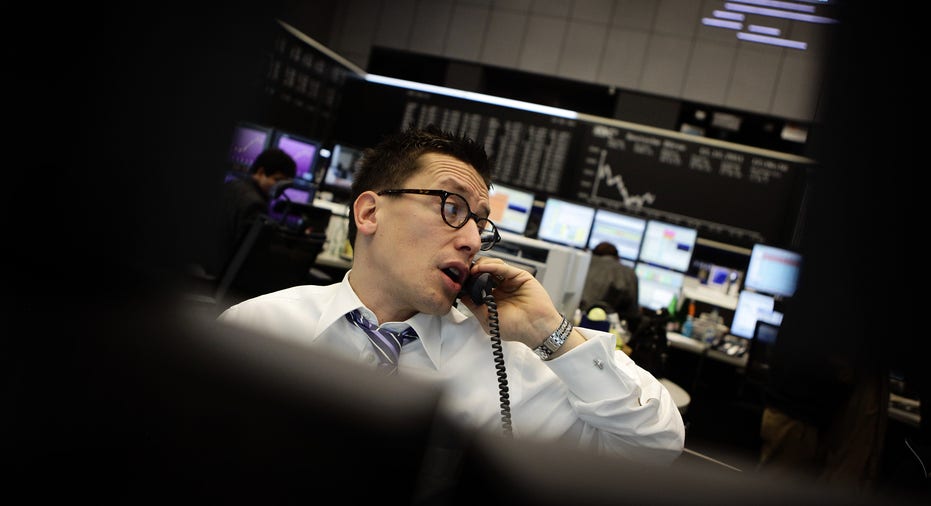Euro Shares Fall as Budget Worries Overshadow Fed Move

European shares and commodities fell on Thursday as worries over the lack of a budget deal in the United States eclipsed the positive impact of new measures by the Federal Reserve to stimulate the world's largest economy.
The Fed said it would buy $45 billion of Treasuries a month on top of the $40 billion a month in mortgage-backed bonds it started buying in September to keep the U.S, recovery on track.
It added that interest rates would remain near zero until unemployment falls to at least 6.5 percent as long as inflation remains low.
But Fed chairman Ben Bernanke also warned that monetary policy would not be enough to offset the damage to growth if talks to close the fiscal deficit in Washington failed, triggering mandatory tax increases and spending cuts.
The MSCI world equity index initially gained on the announcement, extending a seven-day rally on global share markets, before the renewed U.S. budget worries hit European shares and pulled the global index back to 337.75 points, barely changed on the day.
Analysts said investors were right to be cautious.
"If the talks fail and we get 3 or 4 percent of GDP of fiscal tightening, that's going to be a massive, massive drag on economic growth," said Alan Clarke, economist at Scotia Capital.
"Even if we get a compromise and it's just 1 percent of GDP of fiscal tightening ... that would make it very hard for growth to be anywhere near this sort of 2 percent that the consensus is assuming over the coming year."
The concerns produced a marked drop in European share markets, where the FTSEurofirst 300 index fell 0.4 percent to 1,134.965 points, ending a three-week-long rally that has sent prices to 18-month highs.
London's FTSE 100, Paris's CAC-40 and Frankfurt's DAX were all around 0.3 percent lower, while U.S. stock index futures pointed to a lower open when Wall Street resumes trading.
"I think we'll get a slow drift (lower) into the year-end ... There are no real factors that are going to come in to send it significantly higher. The overhang of the fiscal cliff is going to weigh on the upside to a certain extent," said Michael Hewson, senior analyst at CMC Markets.
DOLLAR CHOPPY
In the foreign exchange markets, the dollar initially slipped to a one-week low of 79.71 against a basket of other major currencies after the Fed decision, but it recovered as investors closed positions ahead of the year-end.
"The Fed announcement has had a fairly limited impact on most of the majors," said Adam Cole, global head of FX strategy at RBC Capital Markets.
The dollar index settled to be up 0.12 percent at 79.91, while against the euro the greenback was little changed at $1.3070.
Sentiment toward the euro was helped by a deal clinched early on Thursday to give the European Central Bank new powers to supervise euro zone banks, the first step in a new phase of closer integration to help underpin the single currency.
The euro found some support after former Italian prime minister Silvio Berlusconi, who had abruptly withdrawn support for Prime Minister Mario Monti's government last week, offered to stand back and suggest Monti could become the candidate of a centre-right coalition at an election expected in February.
YEN PRESSURE
The Japanese yen meanwhile came under renewed pressure as markets took the view that the Fed's move made it more likely that the Bank of Japan would further ease monetary policy to support its weak economy at its policy meeting next week.
The dollar rose to near its 2012 high of 84.187 yen to trade around 83.40 yen.
Japan also holds an election on Sunday, with opinion polls showing conservative former Prime Minister Shinzo Abe's opposition Liberal Democratic Party, which favours more stimulus measures, is heading for a resounding victory.
Oil prices retreated on widespread concerns about the growth outlook, with U.S. crude futures down 39 cents at $86.38 a barrel and Brent falling 35 cents to $109.15.
"People are worried about the economy, the fiscal cliff in the U.S., and the European economy still remains a tricky one," said Richard Langkemper, analyst at Argos North Sea Group in Rotterdam.
Gold tumbled by just under 1 percent on stop-loss selling after touching its highest in nearly two weeks on Wednesday to trade around $1,694.20 an ounce.



















